#rep. louis gohmert
Text
Rep. Louie Gohmert (R-Texas) railed against the indictment of former Trump White House adviser Peter Navarro while saying in an interview on Friday that “if you’re a Republican, you can’t even lie to Congress or lie to an FBI agent or they’re coming after you.”
Gohmert, speaking to Newsmax in an interview on Friday, was asked to comment on the Friday indictment of Navarro by a federal grand jury after the former Trump official failed to comply with the House Select Committee investigating the Jan. 6, 2021, Capitol riot.
“It actually puts an exclamation point on the fact that we have a two-tiered justice system. If you’re a Republican, you can’t even lie to Congress or lie to an FBI agent or they’re coming after you. They’re gonna bury you. They’re gonna put you in the D.C. jail and terrorize and torture you and not live up to the Constitution there,” Gohmert responded.
He argued that there was a double standard to how Democrats and Republicans were being treated, pointing to the acquittal of prominent Democratic attorney Michael Sussman, who was being investigated by special counsel John Durham, as one example.
“So [it’s] very clear. If you’re a Democrat, then you can lie. You can cheat. You can do whatever you want,” he said.
The Hill has reached out to Gohmert’s office for further comment and clarification on his remarks.
The development comes against the backdrop of Navarro’s indictment, who is facing two charges of criminal contempt of Congress after being subpoenaed by the House Select Committee.
The Committee is interested in hearing from the former Trump official, looking to hear possible evidence regarding efforts to have the 2020 election results overturned by allies of former President Trump.
“Who are these people?” Navarro asked during his court appearance on Friday. “This is not America. I mean, I was a distinguished public servant for four years and nobody ever questioned my ethics. And they’re treating me in this fashion.”
#us politics#news#the hill#2022#rep. louis gohmert#texas#tx#fbi#house select committee#peter navarro#Republicans#conservatives#gop
19 notes
·
View notes
Video
youtube
Trump's Former Chief Of Staff Denver Riggleman released a new book, in which he described two congressional republicans having a cognitive decline. Cenk Uygur and Jessica Burbank discuss on The Young Turks. Watch LIVE weekdays 6-8 pm ET. http://youtube.com/theyoungturks/live Read more HERE: https://www.mediaite.com/news/ex-gop-congressman-believes-sitting-reps-louis-gohmert-and-paul-gosar-have-serious-cognitive-issues/ "Former Rep. Denver Riggleman (R-VA) wrote in his new book that he wondered whether his far-right ex-colleagues like Louis Gohmert (R-TX) and Paul Gosar (R-AZ) have “serious cognitive issues.” The Guardian obtained an early copy of The Breach, Riggleman’s new memoir where he reflects on his departure from Congress and his assistance to the January 6 Committee. While Riggleman’s decision to write a book has drawn disapproval from those on the committee, the book itself is partially focused on the Congressional Republicans who tried to help the Trump White House overturn the 2020 election results." *** The largest online progressive news show in the world. Hosted by Cenk Uygur and Ana Kasparian. LIVE weekdays 6-8 pm ET. Help support our mission and get perks. Membership protects TYT's independence from corporate ownership and allows us to provide free live shows that speak truth to power for people around the world. See Perks: ▶ https://www.youtube.com/TheYoungTurks/join SUBSCRIBE on YOUTUBE: ☞ http://www.youtube.com/subscription_center?add_user=theyoungturks FACEBOOK: ☞ http://www.facebook.com/TheYoungTurks TWITTER: ☞ http://www.twitter.com/TheYoungTurks INSTAGRAM: ☞ http://www.instagram.com/TheYoungTurks TWITCH: ☞ http://www.twitch.com/tyt 👕 Merch: http://shoptyt.com ❤ Donate: http://www.tyt.com/go 🔗 Website: https://www.tyt.com 📱App: http://www.tyt.com/app 📬 Newsletters: https://www.tyt.com/newsletters/ If you want to watch more videos from TYT, consider subscribing to other channels in our network: The Watchlist https://www.youtube.com/watchlisttyt Indisputable with Dr. Rashad Richey https://www.youtube.com/indisputabletyt Unbossed with Nina Turner https://www.youtube.com/unbossedtyt The Damage Report ▶ https://www.youtube.com/thedamagereport TYT Sports ▶ https://www.youtube.com/tytsports The Conversation ▶ https://www.youtube.com/tytconversation Rebel HQ ▶ https://www.youtube.com/rebelhq TYT Investigates ▶ https://www.youtube.com/channel/UCwNJt9PYyN1uyw2XhNIQMMA #TYT #TheYoungTurks #BreakingNews 220927__TB02_Ex_GOP_Rep by The Young Turks
0 notes
Link
The Interior department refused to testify and Louis Gohmert refused to wear a mask so here we are.
0 notes
Text
The Democrats and the Deep State are getting bold. Just yesterday we found out that the Capitol Police had entered Rep Troy Nehls’ office over Thanksgiving break, snapping pictures, and then came back two days later and harassed a staffer dressed as construction workers, Last night, we found out that the Capitol Police was opening Rep Louis Gohmert’s mail illegally.
38 notes
·
View notes
Link
22 notes
·
View notes
Text
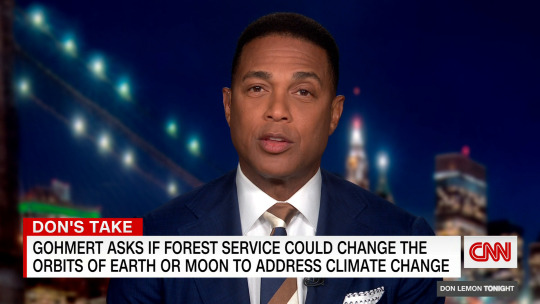
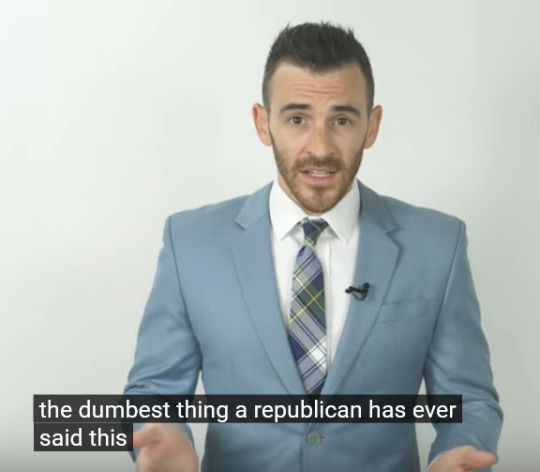
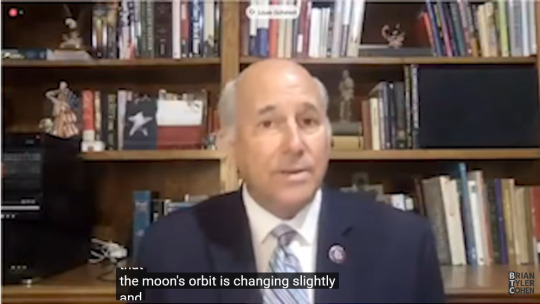
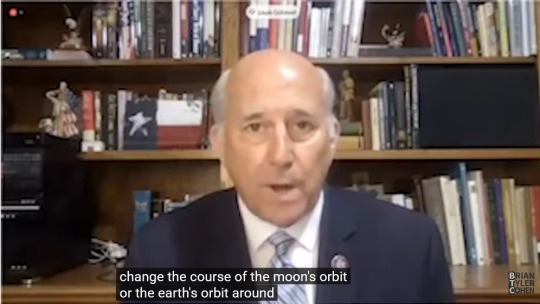
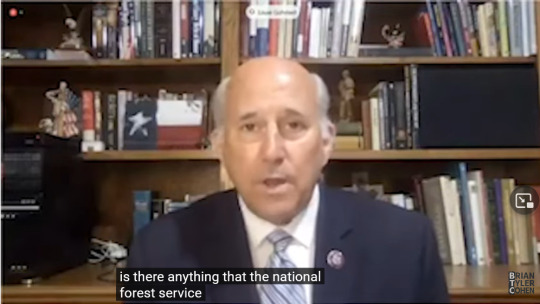
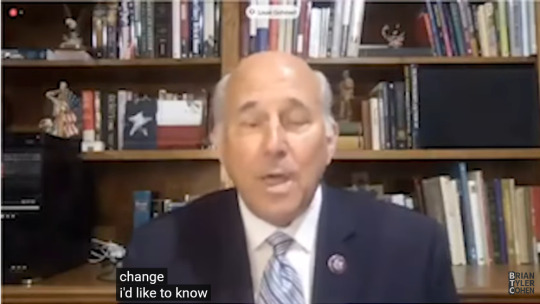
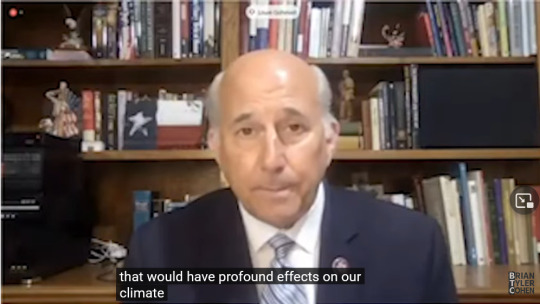
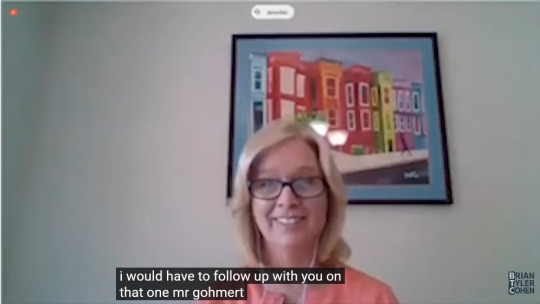
A Republican lawmaker just asked the dumbest question imaginable at a hearing.🤦♂️
Rep. Louie Gohmert (R-TX) asked during a House Natural Resources subcommittee hearing if the National Forest Service and Bureau of Land Management could change the orbits of the moon and Earth in order to help address climate change. Gohmert's office did not respond to CNN's requests to clarify his remarks.
youtube
Comments
When I heard about this as reported by Forbes, I thought it was a joke. How could that woman keep a straight face? Great commentary.
Louie "Gomer's Pile" Gohmert, ladies and gentleman. God's gift to stupidity.
Trump : Nobody will outdo me in stupidity when I say- "why not inject disinfectant to fight coronavirus?" Louie gomert: Hold my Beer 🍺
Sure, Louis, attempting to change the earth’s and moon’s orbits would be SOOOO much less expensive than what can be done here on earth!
Remember: people voted for this man. Fund public education already. This world have profound effects.
I'm impressed by that woman's resolve to stay calm, i would've laughed my *ss off if i was in her place😂🤣.
That poor lady. See how she paused before she answered and THEN EVEN smiled through her answer. No one takes Gohmert serious, NO ONE! LMBO!!
20 notes
·
View notes
Text
27 notes
·
View notes
Text
The committee filed deposition excerpts on Friday, which detail how Republican lawmakers, such as Reps. Matt Gaetz and Jim Jordan, plotted with Trump to stop then-candidate Joe Biden from becoming president.
Gaetz, Jordan, and other Republican lawmakers participated in calls and meetings with Trump and his aides after he lost the 2020 presidential election, according to testimony given to the committee by Cassidy Hutchinson, who served as an aide to former White House Chief of Staff Mark Meadows.
Hutchinson said in the deposition records that various Republican lawmakers, including Gaetz, Jordan, Reps. Scott Perry, Marjorie Taylor Greene, and Louis Gohmert, either met in person or dialed into meetings discussing ways to usurp Biden's victory.
"They felt that [former Vice President Mike Pence] had the authority to — pardon me if my phrasing isn't correct on this, but — send votes back to the States or the electors back to the States," Hutchinson said.
Other Republican lawmakers who are part of the House Freedom Caucus were also part of these meetings, Hutchinson said. Representatives for Gaetz, Jordan, Perry, Taylor Greene, and Gohmert did not immediately respond to Insider's request for comment.
During these meetings, the Republican lawmakers explored avenues that "could potentially be a constitutional and viable option to either stall certification of the election or to delay the inauguration or to assert that Mr. Trump had actually won," she said.
After the results of the 2020 presidential election came out, the Trump campaign has filed dozens of lawsuits alleging voter fraud, most of which have so far been denied, dismissed, or withdrawn.
Independent election watchdog groups have said repeatedly that there was no widespread voter fraud. After the results came out, for example, The New York Times contacted election officials in every state, each of which said there is no evidence that fraud influenced the presidential election.
But even after leaving office, Trump has continued to insist that the election was rigged. Republican lawmakers have echoed his unsubstantiated claims.
#us politics#news#2022#rep. matt gaetz#trump administration#capitol protests#capitol riot#capitol riot investigation#rep. jim jordan#Cassidy Hutchinson#mark meadows#rep. scott perry#rep. marjorie taylor greene#rep. louis gohmert#House Freedom Caucus#business insider#the new york times
19 notes
·
View notes
Text
1 note
·
View note
Link
A Google representative said Tuesday that hate “has no place on YouTube,” a platform the company runs, during a congressional hearing on the rise of hate crimes and white nationalism just after YouTube users spent more than an hour leaving vile messages on an official video feed of the event.
Alexandria Walden, a public policy counsel at Google focused on free expression and human rights, was among the witnesses called before the House Judiciary Committee. Shortly before she began speaking, the comments section of the committee’s official video stream of the hearing was shut off, having been filled with anti-Semitic, Islamophobic, racist and otherwise hateful notions.
“We are deeply troubled by the increase of hate and extremism in the world,” Walden said. “We take these issues seriously and want to be part of the solution.”
After describing the difficulty in identifying hate speech due to its reliance on context and noting how “borderline” hateful content can be pushed to the sidelines of the platform, Walden stated: “Hate speech and violent speech have no place on YouTube.”
What was happening on the live stream told a different story, however. Commenters were able to leave messages containing slurs for Jewish people and Muslims while others typed “14,” which refers to a white nationalist slogan, and “88,” which signals “Heil Hitler” in white nationalist circles.
Committee chairman Jerry Nadler (D-N.Y.) pointed out that the comments had been turned off during the hearing and read a short selection of them. Rep. Louis Gohmert (R-Texas) cut in to ask whether the comments were somehow a “hoax.”
In November, the FBI reported that hate crimes had risen across the U.S. for the third consecutive year.
The committee’s hearing comes just weeks after a horrific mass shooting at two mosques in Christchurch, New Zealand, left 50 worshippers dead.
Many have suggested the massacre to be a tragic consequence of the spread of white nationalism around the world, aided by social media. The Christchurch shooter wrote a lengthy manifesto suggesting he had been motivated by white nationalist ideals and live-streamed 17 minutes of the shooting to Facebook through a body camera.
YouTube and Facebook were slammed for allowing the shooter’s gruesome video to proliferate across their platforms. Both companies were forced to play a game of whack-a-mole against users who uploaded copies of it en masse, raising questions about the tech giants’ ability to monitor and suppress hateful content.
Facebook Public Policy Director Neil Potts said at the hearing that white nationalist and hateful content was not permitted on the site “under any circumstances.” The social media giant just this week said it would ban white nationalist content.
#sure rep gohmert#it's a hoax#just a bunch of jews and muslims making shit up#couldn't possibly be actual white nationalists and white supremacists slurring jews and muslims
20 notes
·
View notes
Text
Live: Mueller grilled on obstruction, ‘fishing’ without charging Trump
https://wapo.st/2Z4ThrU
Live: Mueller grilled on obstruction, ‘fishing’ without charging Trump (Updates Thus Far Part 1)
By Washington Post Staff | Published July 24 at 10:41 AM ET | Washington Post | Posted July 24, 2019 10:52 PM ET
This live story is being reported by Matt Zapotosky, Karoun Demirjian, Rachael Bade, Rosalind S. Helderman, Tom Hamburger, Shane Harris, Devlin Barrett, John Wagner and Rachel Weiner.
Former special counsel Robert S. Mueller III is testifying publicly before two separate congressional panels Wednesday and for the first time is addressing questions about his investigation of President Trump and Russian interference in the 2016 election.
The first hearing, before the House Judiciary Committee chaired by Rep. Jerrold Nadler (D-N.Y.), began just after
8:30 a.m., and the second, before the House Intelligence Committee, will begin at noon.
Democratic lawmakers are digging into the episodes Mueller outlined in his 448-page report of potential obstruction of justice by Trump. Mueller has said that he preferred not to say more about his work in public and — if made to do so — that he would not speak beyond what was detailed in his report.
Republicans, meanwhile, are likely to grill Mueller on what they view as impropriety in his investigation, focusing intensely on anti-Trump text messages exchanged by an FBI agent and an FBI lawyer who worked on the case.
Follow our live coverage here throughout the day.
10:30 a.m.: “I’m just going to leave it as it appears in the report”
Back from a break, Rep. Cedric L. Richmond (D-La.) tried to press Mueller on an episode in his report alleging that Trump had directed former White House Counsel Donald McGahn to have the special counsel fired, and then lie about it.
As he has throughout the hearing, Mueller merely confirmed that the lines that Richmond read were accurate.
“Correct,” he said repeatedly, as Richmond described the episode. “Generally true.”
Richmond tried to convince Mueller to elaborate, asking the open-ended question, “Can you explain what you meant there?” But Mueller balked.
“I’m just going to leave it as it appears in the report,” he said.
10:20 a.m.: Pence aides back Trump’s account of 2017 meeting with Mueller
Aides to Vice President Pence confirmed Trump’s account earlier Wednesday that Pence was present during a 2017 meeting in which Trump says Mueller sought to return to the job of FBI director.
Alyssa Farah, a spokeswoman for Pence, confirmed in an email that Pence was present for the meeting in the Oval Office “when Robert Mueller interviewed for the job of FBI Director in May of 2017.”
During his testimony Wednesday, Mueller confirmed that he met with Trump about the position of FBI director but “not as a candidate.”
Former White House chief strategist Stephen K. Bannon told investigators that the purpose of the meeting was not a job interview but to have Mueller “offer a perspective on the institution of the FBI,” according to the special counsel’s report.
Trump has previously cited the meeting as evidence for his contention that Mueller had conflicts of interest.
During a morning tweet, Trump suggested that Pence could back him up if Mueller did not tell the truth about the meeting
10:15 a.m.: The mysterious case of Joseph Mifsud
President Trump’s ally Rep. Jim Jordan (R-Ohio) grilled Mueller Wednesday about Joseph Mifsud, the Maltese professor who told former Trump campaign aide George Papadopoulos that the Russians had dirt on Hillary Clinton — but lied to federal investigators and was never charged.
Mifsud’s information — which Papadopoulos later related to Australia’s then-ambassador to the United Kingdom, who alerted the FBI — prompted the entire investigation that formed the foundation for Mueller’s probe. Republicans have questioned those origins — but Jordan and others in the GOP have also specifically questioned whether Mifsud was a potential Western intelligence asset, set up to trick Papadopoulos into passing on information that would prompt the probe of Trump’s Russia ties.
The Mifsud theory has failed to catch on outside the Republican base, but Jordan focused his questions for Mueller on one simple aspect of it: Why, if the special counsel had charged so many of Trump’s associates for lying to the FBI, had he never brought charges against Mifsud, who lied repeatedly to federal agents and whose words launched the entire Russia probe?
“You can charge all kinds of people around the president with false statements … but the guy who puts this whole story in motion, you can’t charge him,” Jordan challenged Mueller.
“I’m not sure I agree with your characterizations,” retorted Mueller, who also said it was “obvious we can’t get into charging decisions” during the public hearing.
10:10 a.m.: Mueller continues one- or two-word responses to confirm obstruction episodes
Democrats — appearing to realize that Mueller would not elaborate on his report — continued to read key episodes of the 448-page documents and ask him to confirm the accounts with simple “yes” and “no” answers.
Rep. Karen Bass (D-Calif.) guided Mueller through an episode in his report in which Trump tried to convince his former White House counsel Donald McGahn to deny reports that Trump requested he fire Mueller.
In late January 2018, the New York Times reported that McGahn had threatened to resign the previous year rather than follow through on an order from Trump to fire Mueller. Muelller’s report describes how Trump pressured McGahn to deny the story, including in an Oval Office meeting, in which Trump asked if McGahn would “do a correction.” McGahn said that he would not.
Trump also asked then-aide Rob Porter to tell McGahn to “create a record” making it clear that Trump had never directed McGahn to fire Mueller. He told Porter that if McGahn didn’t write a letter to file on the issue, he might have to “get rid of him.”
There is “substantial evidence,” Mueller wrote in his report, that in repeatedly urging McGahn to dispute that he was ordered to have the special counsel fired, Trump was acting to try to influence McGahn’s account and prevent further scrutiny of Trump’s conduct with regards to the investigation.
Mueller, however, wouldn’t elaborate, confirming these details with simple answers, including “correct” or “yes.” Bass ended her five-minute session with her own statement: “If anyone else had ordered a witness to create a false record … that person would face criminal charges.”
10:05 a.m.: Roby pushes Mueller to explain interactions with the attorney general
Rep. Martha Roby (R-Ala.) asked Mueller to explain his interactions with Attorney General William P. Barr, whom Democrats have said mischaracterized the special counsel’s work.
She asked Mueller whether he had “sought to change the narrative” about his report when he signed a March letter to Barr complaining about the way the attorney general originally characterized his findings.
In that late March letter, Mueller expressed dissatisfaction to Barr about the attorney general’s initial four-page memo to Congress describing the principal conclusions of the investigation.
Mueller wrote that Barr’s memo “did not fully capture the context, nature and substance” of the work his staff had completed.
At a May hearing, Barr called Mueller’s letter “a bit snitty.”
Roby pushed Mueller to explain how his letter had leaked publicly and asked who wrote the document. “I can’t get into who wrote it,” Mueller said. “I will say the letter stands for itself.”
10 a.m.: Why did Trump want Mueller gone?
Democrats’ efforts to get Mueller to explain the motivations of the president fell flat Wednesday, even when it came to getting Mueller to repeat assertions his report made about precisely those questions.
“The most important question I have for you today is why: why did the president of the United States want you fired?” Rep. Ted Deutch (D-Fla.) asked Mueller, who said he couldn’t answer the question. So Deutch answered it for him, by citing a passage from the report in which Mueller wrote “substantial evidence indicates that the president’s attempts to remove the special counsel were linked to the special counsel’s oversight of investigations that involved the president’s conduct, and most immediately to reports that the president was being investigated for potential obstruction of justice.”
Deutch focused most closely on Trump’s contacts with former White House counsel Donald McGahn, a key witness in Mueller’s probe, who told investigators about how Trump appeared to order him to carry out Mueller’s termination, and later lie about it.
Deutch asked Mueller if McGahn understood what the president’s motivations were. Mueller referred him “toward what was written in the report, in terms of characterizing his feelings.”
9:57 a.m.: Mueller and Gohmert spar
Rep. Louis Gohmert (R-Tex.), an old nemesis of Mueller’s, spent his five minutes on the attack. First, he got Mueller to concede that he and fired former FBI director James B. Comey “were friends.” Then, he tried to suggest that the FBI investigation of the president was politically biased from the beginning.
As Gohmert’s tempo quickened and frequently cut off Mueller’s attempted answers, the former special counsel asked in frustration, “May I finish?”
Gohmert barreled forward, arguing that, rather than obstruct justice, Trump set out to defend himself from Trump-hating prosecutors and agents.
“What he’s doing is not obstructing justice. He is pursing justice and the fact that you ran it out two years means you perpetuated injustice,” Gohmert said.
Gohmert and Mueller have a history of antagonism. At a congressional hearing in 2013 when Mueller was FBI director, the congressman angrily accused the FBI of missing a key investigative step before the Boston Marathon bombing. Mueller, who generally takes a low-key approach to congressional hearings, got angry and denied the accusation.
[Transcript: Read Mueller’s testimony before the House Judiciary panel]
9:55 a.m.: Johnson: Diving into an obstruction episode
Rep. Hank C. Johnson (D-Ga.) has begun the Democrats’ strategy of asking sharp, tight questions to explore specific episodes of possible obstruction of justice described in Mueller’s report.
Johnson asked a series of “yes” and “no” questions about an episode described in the report in which Trump called McGahn, the White House counsel, twice at home over a weekend in June 2017 and directed him to get Deputy Attorney General Rod J. Rosenstein to fire Mueller.
“Mueller has to go,” McGahn recounted Trump told him, according to the report. “Call me back when you do it.”
Rather than following the order, McGahn drove to the White House to pack up his belongings and informed three other White House staffers he intended to resign. Ultimately, McGahn remained in his post, and Trump let the matter drop.
Mueller wrote in his report that “substantial evidence” existed that Trump’s efforts to remove Mueller were linked to the special counsel’s investigation of Trump’s conduct.
Parceling out those details, Mueller continually said Johnson had his facts “correct” or that he had “generally” followed the account of the report. But Mueller declined to be pushed even a bit beyond the exact words of the report. At one point, Johnson asked Mueller if he could explain the “significance” of the phone call Trump made to McGahn at home on a Saturday to discuss Mueller. “I’m going to ask you to rely on what we wrote in our report about that,” Mueller responded.
9:45 a.m.: Mueller declines to answer questions on Steele dossier’s origins
Mueller declined to answer a series of questions from Rep. Steve Chabot (R-Ohio) about the origins of the Steele dossier, the memos alleging various connections between members of the Trump campaign and the Russian government.
Mueller repeatedly said that the dossier and Fusion GPS, the U.S.-based investigation company that hired Christopher Steele, a former British intelligence officer, were “outside my purview,” and that the Justice Department was already investigating the dossier.
Republicans have seized on Steele’s research to argue that the FBI probe of the Trump campaign was begun improperly, saying that federal agents leaned too heavily on it when they sought a warrant to monitor the communications of former Trump campaign adviser Carter Page because of his contacts with Russians.
Republicans have also argued the Steele dossier was opposition research funded by the Hillary Clinton campaign. Clinton’s campaign did hire a law firm that hired Fusion GPS. Steele had begun his research earlier at the behest of conservative funders who wanted to compile opposition research about Trump.
9:40 a.m.: Democrats read portions of report themselves, as Mueller responds with short affirmations
Rep. Steve Cohen (D-Tenn.) sought to guide Mueller through one of the most explosive chapters of his report’s presentation of potential obstruction of justice — Trump’s appeals to then-attorney general Jeff Sessions to steer investigative scrutiny away from him — and was met with mostly one-word answers from Mueller.
Sessions recused himself from the government’s investigations of Russia and Trump before Mueller was appointed as special counsel, a decision that Trump tried to get him to undo, as documented in the report. Cohen attempted to sweep Mueller up in a dramatic retelling of the episodes, but the former special counsel’s preferred response was to simply tell him: “that’s in the report,” “I’ll refer you to the report for that,” or some variation.
The exchange illustrated what has been on display throughout the hearing: that for the most part, Mueller is offering sparse responses, and mostly leaving it to Democratic lawmakers to bring the words of his report to life in their own voices.
9:34 a.m.: Another Republican accuses Mueller of ‘fishing’ without charging Trump
Rep. F. James Sensenbrenner Jr. (R-Wis.), who once chaired the Judiciary panel, used his time to criticize Mueller for laying out hundreds of pages worth of investigative material on Trump without charging him with any crime.
Citing the second volume of Mueller’s report, in which Mueller said he decided not to make a traditionally prosecutorial judgment about whether Trump obstructed justice, Sensenbrenner asked why Mueller did the entire investigation when he knew he wasn’t ever going to prosecute Trump.
“The OLC opinion itself says that you can continue the investigation … even if you don’t indict the president,” Mueller responded, referring to Justice Department rules barring the prosecution of a sitting president.
“If you’re not going to indict the president, then you’re just going to continue fishing, that’s my opinion,” Sensenbrenner said.
Sensenbrenner grew visibly frustrated with Mueller when he had to repeat his questions several times. Sensenbrenner also probed why Mueller didn’t use the phrase “impeachable conduct” to describe any actions by Trump laid out in his report, particularly since he appeared to kick to Congress the determination of whether Trump obstructed justice. Mueller merely answered that wasn’t in his mandate.
9:25 a.m.: Rep. Sheila Jackson Lee launches questions on obstruction
Rep. Sheila Jackson Lee (D-Tex.) pushed Mueller on obstruction of justice, walking the former special counsel, through a series of rapid-fire questions about Volume II’s discussion of potential obstruction of justice, expected to be a recurrent theme of inquiry for Democrats.
In that second volume, Mueller’s team described 10 episodes in which Trump’s actions raised concern about potential obstruction of justice. In some of those cases, the special counsel indicated there was evidence to support key elements of an obstruction charge. But the report stopped short of making an assessment that Trump committed a crime. Democrats repeatedly said before the hearing that they planned to focus on those episodes.
While Jackson Lee’s questions were predictable, Mueller responded in a halting manner, repeatedly asking the Texas lawmaker to repeat her questions.
Her final query was whether conviction on an obstruction of justice charge warranted a significant amount of time in jail. “Yes,” Mueller responded.
9:20 a.m.: Ratcliffe: Mueller applied an “inverted burden of proof”
Rep. John Ratcliffe (R-Tex.) made a lengthy speech, accusing Mueller of inverting the American legal system’s traditional presumption of innocence by declaring in Volume II of his report that he was not recommending charging Trump with obstruction of justice but also could not exonerate him.
Ratcliffe questioned Mueller about whether a prosecutor had ever before found it be his role to conclusively determine a person’s innocence — as opposed to determining whether evidence existed that he committed a crime. Mueller said he could not think of another case and then quietly interjected, “This is a unique situation.”
Ratcliffe then jumped in to say that nowhere in Justice Department policies and standards or in the order appointing Mueller as special counsel could such a mission be found. The presumption of innocence, Ratcliffe said, “exists for everyone. Everyone is entitled to it — including the president.”
The congressman said Mueller had “applied this inverted burden of proof” and then wrote a report about it.
He noted that Democrats have said Trump is not above the law.
“He’s not,” Ratcliffe said. “But he damn sure shouldn’t be below the law, which is where Volume II of this report puts him.”
Mueller sat quietly and did not respond.
9:15 a.m. Mueller says Russians believed a Trump victory would benefit them
Under questioning from Rep. Zoe Lofgren (D-Calif.), Mueller said that the Russians did perceive that the victory of one presidential candidate would benefit them: “It would be Trump,” Mueller said.
The former special counsel also confirmed findings from his report that Trump campaign chairman Paul Manafort gave internal campaign information and polling data to an associate whom the FBI has assessed has ties to Russian intelligence.
But Mueller declined to discuss how that information might have assisted the Russians in their efforts to disrupt the campaign. “That’s a little bit out of our path,” Mueller said.
9:10 a.m.: Collusion, conspiracy or none of the above?
Rep. Douglas A. Collins, the panel’s ranking Republican, and Mueller got into a tense back-and-forth about a comparison of terms that has bedeviled the public chatter surrounding Mueller’s probe: if Mueller didn’t find Trump was guilty of a conspiracy, does that also mean he was exonerated of collusion?
Technically, collusion isn’t a specific crime, but in his report, Mueller acknowledged that in common parlance, “collusion is largely synonymous with conspiracy as that crime is set forth in the general federal conspiracy statute.” But when Collins asked him Wednesday if they were colloquially equivalent, Mueller said “No.”
Collins then repeatedly asked Mueller, “Are you contradicting your report,” repeatedly reading from the former special counsel’s text and asking if he needed to speak more slowly for Mueller to follow him.
“I leave it with the report,” Mueller ultimately said, prompting Collins to say he hoped the collusion question could “finally” be put to rest.
9:05 a.m.: Mueller pushes back on Trump’s ‘no collusion, no obstruction’ claim
Mueller rejected claims by Trump that his report cleared him from wrongdoing and confirmed that he could be charged after he leaves office.
In the first back-and-forth, Nadler, the committee chairman, listed a series of basic yes-or-no questions — or inquiries that could be answered in a few words — to get Mueller to confirm that he did not exonerate Trump.
“Did you actually totally exonerate the president?” the New York Democrat asked.
“No,” Mueller said.
“Does that say there was no obstruction?” Nadler said, reading an excerpt from the report where Mueller’s team discussed they could not “exonerate” Trump on the matter.
“No.”
Mueller went on to talk about Justice Department rules that say a sitting president cannot be indicted.
“The report did not conclude that he did not commit of obstruction of justice,” Nadler asked again.
“That is correct,” Mueller said.
The president has repeatedly claimed the report showed there was “no collusion” and “no obstruction.”
Asked if “under DOJ policy the president could be prosecuted for obstruction of justice crimes after he leaves office,” Mueller responded: “True.”
Mueller also confirmed that Trump refused to be interviewed by his team.
9 a.m.: Mueller makes clear his investigation did not exonerate the president
“The president was not exculpated for the acts that he allegedly committed,” the former special counsel told the House Judiciary Committee.
Asked whether the president could potentially be indicted after leaving office, Mueller responded, “True.”
8:55 a.m.: What Mueller stressed in his opening statement
In his opening statement, Mueller stressed three points: the special counsel’s investigation found “sweeping and systematic” Russian interference in the 2016 election, it did not establish a conspiracy between the Kremlin and the Trump campaign and its inquiry into obstruction was “of critical importance.”
In response to later questions, Mueller would say more explicitly, as his report did, that the investigation did not exonerate Trump on obstruction. But in his opening statement, he stopped short of even that.
“Finally, as described in Volume 2 of our report, we investigated a series of actions by the president toward the investigation,” Mueller said. “Based on Justice Department policy and principles of fairness, we decided we would not make a determination as to whether the president committed a crime. That was our decision then and it remains our decision today.”
8:50 a.m.: The topics Mueller says he won’t address
In his prepared opening statement, Mueller reiterated that he plans to stay “within the text” of his 448-page report and provided a list of questions he won’t be able to answer.
“In writing the report, we stated the results of our investigation with precision. We scrutinized every word,” Mueller said. “I do not intend to summarize or describe the results of our work in a different way in the course of my testimony today.”
Likely to the disappointment of Republicans, he said he would be “unable to address questions about the opening of the FBI’s Russia investigation, which occurred months before my appointment, or matters related to the so-called ‘Steele Dossier.’” Conservatives have focused much of their ire on that document — an opposition research product funded by the Clinton campaign that made lurid and unproven allegations against Trump and played a role in the early portion of the Russia investigation.
Likely to the dismay of Democrats, Mueller also said he would “not comment on the actions of the attorney general or of Congress.”
Mueller noted that court rules or judicial orders limit the disclosure of some information, and that the Justice Department had asserted “privileges concerning investigative information and decisions, ongoing matters within the Justice Department, and deliberations within our office.”
“These are Justice Department privileges that I will respect,” Mueller said.
8:45 a.m.: Republicans to question origins of Mueller report
#politics#u.s. news#donald trump#trump administration#politics and government#president donald trump#white house#trump#us: news#republican politics#republican party#must reads#international news#legal issues#trump scandals#democratic party#democrats#democracy#world news#russia investigation#robert mueller#corruption#criminal-justice#read the mueller report#impeachthemf#mueller report#impeachtrump#trumpism
1 note
·
View note
Link
0 notes
Text
The Dumbest Man In Congress, Louie Gohmert, Announces Run For Texas AG
The Dumbest Man In Congress, Louie Gohmert, Announces Run For Texas AG
1/6 coup co-conspirator and widely regarded dumbest man in Congress, Rep. Louie Gohmert, announced his run for Texas Attorney General.
Video:
BREAKING: Louis Gohmert officially announces he will run against Ken Paxton for Texas Attorney General. pic.twitter.com/r2vBMOpIai
— Ron Filipkowski (@RonFilipkowski) November 23, 2021
Gohmert said, “I’d announced a few days ago that if we could raise a…
View On WordPress
0 notes
Text
Patrick Svitek on Twitter: "We've got a website up saying @replouiegohmert is exploring a run for AG. He was supposed to have an announcement at 11:30 in Tyler, tweeted a livestream around noon that didn't work and isn't answering calls. #TX01" / Twitter
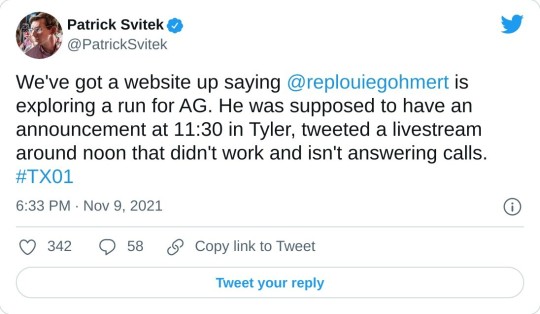
Rep. Louis Gohmert (R-TX) is soliciting donations for an “exploratory” bid for Texas attorney general, the Texas Tribune reports.
From the site: “We need a Texas Attorney General whose top attorneys working for him have not found it necessary to send a letter to the FBI urging an investigation into corruption of their boss.”
0 notes
Text
Louie Gohmert Admits He's "Dumbest Guy In Congress"
Louie Gohmert Admits He’s “Dumbest Guy In Congress”
Rep. Louie Gohmert accidentally to being the "dumbest guy in Congress…" finally, we can agree on something! Cenk Uygur, Wosny Lambre, and Bridget Todd discuss on The Young Turks. Support TYT by becoming a member: http://tyt.com/join Read more HERE: https://www.independent.co.uk/news/world/americas/us-politics/louis-gohmert-dumbest-guy-congress-b1851356.html "A Texas Republican was mocked for…
youtube
View On WordPress
0 notes
Link
What is the 14th Modification and the way does it work? That language is also employed in opposition to members of Congress who supported Trump’s effort, in keeping with Rep. Cori Bush, a freshman Democrat from Missouri. “Tomorrow, I am introducing my decision to expel the members of Congress who tried to overturn the election and incited a white supremacist coup try that has left folks useless. They’ve violated the 14th Modification,” Bush stated Sunday on Twitter. “We won’t have unity with out accountability.” Home Speaker Nancy Pelosi has requested members of Congress for his or her enter on whether or not to pursue such an effort. What does the 14th Modification do? The 14th Modification was an extremely consequential addition to the Structure again in 1866 after the Civil Conflict. It offers citizenship to anybody born in america and ensures “equal safety underneath the legal guidelines” to all residents and imposed the Invoice of Rights on the states. Trump has argued throughout his presidency that the birthright citizenship clause of the Modification needs to be modified. Nevertheless it’s the a lot less-known language of Part 3 of the 14th Modification that offers with acts of revolt: No particular person shall be a Senator or Consultant in Congress, or elector of President and Vice President, or maintain any workplace, civil or navy, underneath america, or underneath any state, who, having beforehand taken an oath, as a member of Congress, or as an officer of america, or as a member of any state legislature, or as an govt or judicial officer of any state, to assist the Structure of america, shall have engaged in revolt or rise up in opposition to the identical, or given support or consolation to the enemies thereof. However Congress might by a vote of two-thirds of every Home, take away such incapacity. Clearly all officeholders took an oath to uphold the Structure. And the Structure requires an election an Electoral School vote to find out the following president. Anybody complicit in inciting the riot bent on stopping that course of might fairly be thought of to have violated it. However expelling lawmakers will not be one thing Congress does frivolously. A handful of lawmakers had been expelled on the outbreak of the Civil Conflict for supporting the Confederacy. No lawmaker has ever been dismissed utilizing the 14th Modification since its ratification after the conflict. Solely two different congressmen had been expelled, for ethics violations, within the intervening 160 years. Normally, lawmakers with huge authorized points resign. What about members of Congress? Lawmakers who could also be focused by Bush’s effort to use the modification in Congress embody Republican Reps. Mo Brooks of Alabama and Louis Gohmert of Texas took half within the Washington rally the sparked the storming of the Capitol. “Right this moment is the day American patriots begin taking down names and kicking ass,” Brooks advised Trump’s supporters on Wednesday, earlier than they tried to disrupt the American authorities. Republican Sens. Josh Hawley of Missouri and Ted Cruz of Texas have additionally been mentioned as 14th Modification violators. They’re the senators who objected to counting electoral votes, together with many extra colleagues within the Home, and Hawley raised a fist to the rioters in solidarity earlier than they stormed the Capitol. How a 14th Modification case would look The 14th Modification case could be simpler to make in opposition to Brooks and Gohmert than Hawley and Cruz. “Those that spoke phrases of violence, incitement to riot on the rally earlier than the assault on the Home, they’re doubtlessly culpable for revolt,” Norm Eisen, who served as an legal professional for Democrats throughout Trump’s impeachment, advised CNN. It could be tougher to make the 14th Modification case in opposition to Cruz and Hawley, who, even though they unfold lies concerning the election on the Senate flooring, might argue they had been making an attempt to defend democracy, not incite the riot. Not even all Democrats are able to definitively say they’re able to pursue a 14th Modification case in opposition to their colleagues. “I believe it’s relevant. However that is one thing we’ve to speak about,” stated Rep. Jim McGovern of Massachusetts, who chairs the Home Guidelines committee, throughout an interview on CNN, though he actually thinks they need to resign. “The individuals who helped trigger this should not the individuals who can lead in therapeutic. They should transfer out of the way in which. To attempt to overturn a reputable election and trample on the need of the American folks is one thing that’s unforgivable. These folks don’t belong in workplace,” he stated. Whereas Congress does have the flexibility to expel members, the language of the 14th Modification suggests, which refers to Congress imposing the provisions of the modification “by acceptable laws,” suggests a President would additionally should log off. Congress does have the flexibility, with a two-thirds supermajority, to expel a member. That may require assist from Republican lawmakers. Former Rep. Charlie Dent, a reasonable Republican from Pennsylvania and now a CNN political analyst, stated Congress ought to let the voters resolve the destiny of their representatives. “Many of those members have exercised horrible political judgment, notably senators Hawley and Cruz, however on the finish of the day, I believe they’ve needs to be judged by their voters for his or her deeds and their horrible judgment,” he stated. The 14th Modification and Trump The 14th Modification is also utilized in opposition to Trump, ought to he search workplace sooner or later, to exclude him from the poll, stated Gerard Magliocca, a legislation professor at Indiana College who just lately wrote concerning the historical past and software of the modification’s third part. Learn his paper right here. Magliocca stated the 14th Modification had excluded Confederates from working for workplace after the Civil Conflict. That’s, till Congress handed a kind of blanket amnesty eradicating that penalty from most Southern males as a part of an effort at reconciliation. (There was, bizarrely, a symbolic effort that granted the identical courtesy to Robert E. Lee and Jefferson Davis within the Seventies.) Right this moment, if a state determined Trump had violated the 14th Modification, he might need to sue to get on the poll. If lawmakers from each chambers of Congress move resolutions that he had violated the Modification, it might even have the impact of holding him from federal workplace sooner or later. “It is one thing greater than a censure, which simply says, “you had been dangerous and do not do it once more, proper? Nevertheless it’s one thing lower than an impeachment as a result of it would not require an impeachment trial and the 2 thirds vote within the Senate and so forth. So it is a mind-set about this in a extra of a compromise sort of style,” Magliocca stated, though he added it will beforehand would have been not possible to think about utilizing a provision written to maintain insurrectionists out of presidency in opposition to a sitting US President who’s already in control of the federal government. “That half is extra novel,” he stated. “However I believe it is in line with the kind of underlying goal of it, which is to maintain folks out of workplace who’ve so severely betrayed the general public belief that they can’t be trusted with all this once more.” He additionally identified that when the modification was first handed, Congress handed a legislation, which remains to be on the books, to offer the Division of Justice energy to take away ineligible folks from workplace. Supply hyperlink #14th #14thAmendment:Whatisitandhowdoesitwork?-CNNPolitics #Amendment #Politics #Whats #Work
0 notes